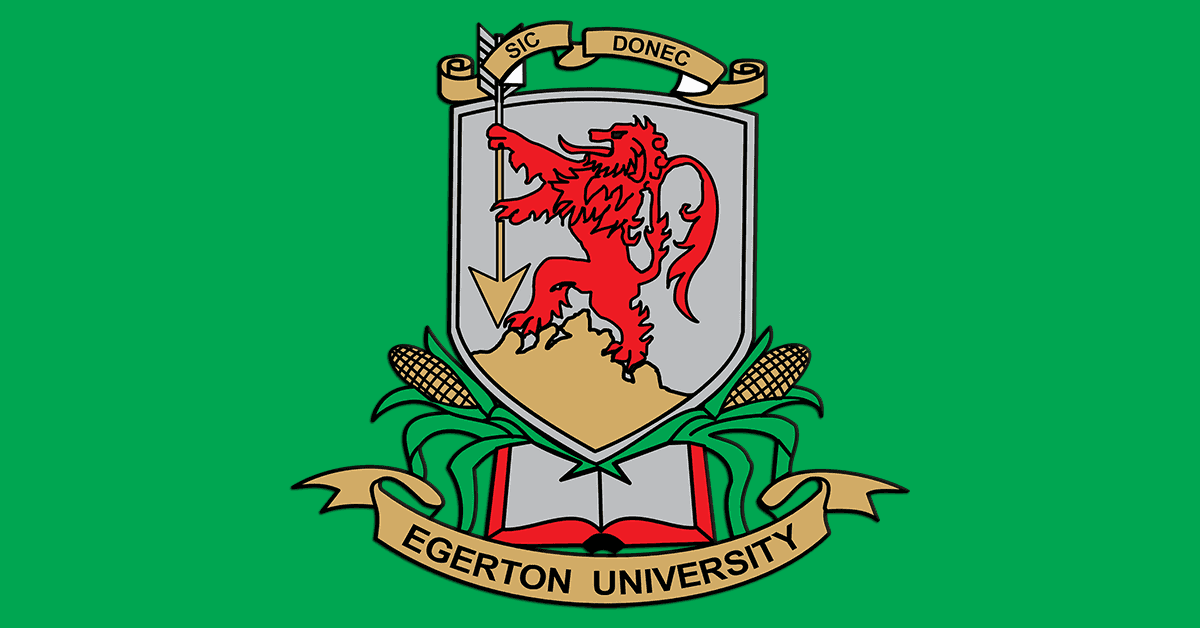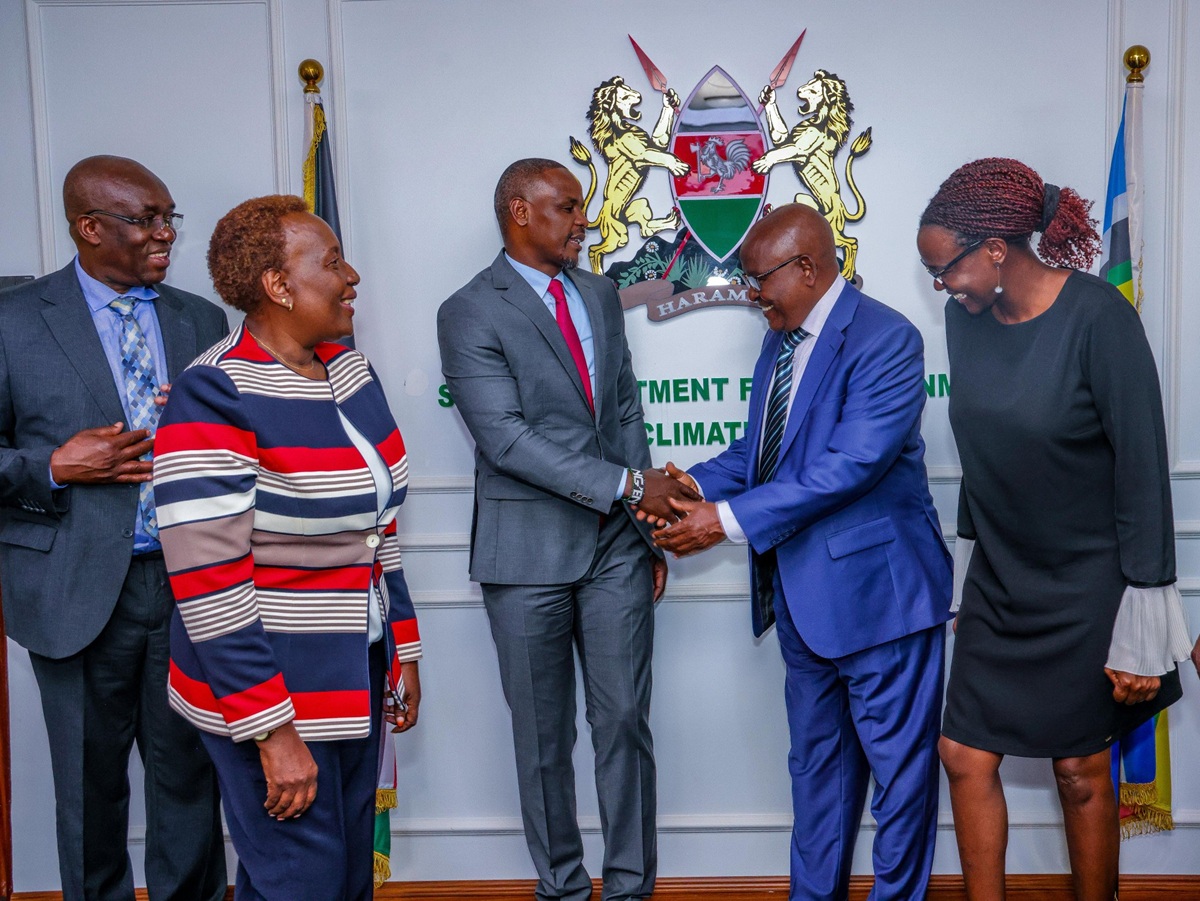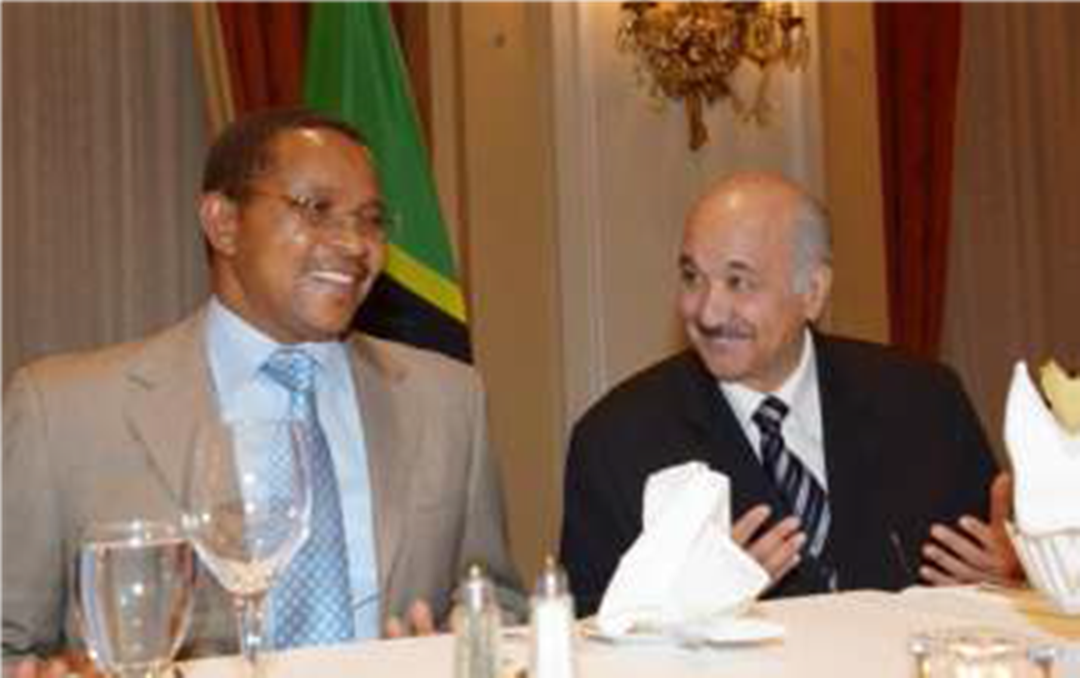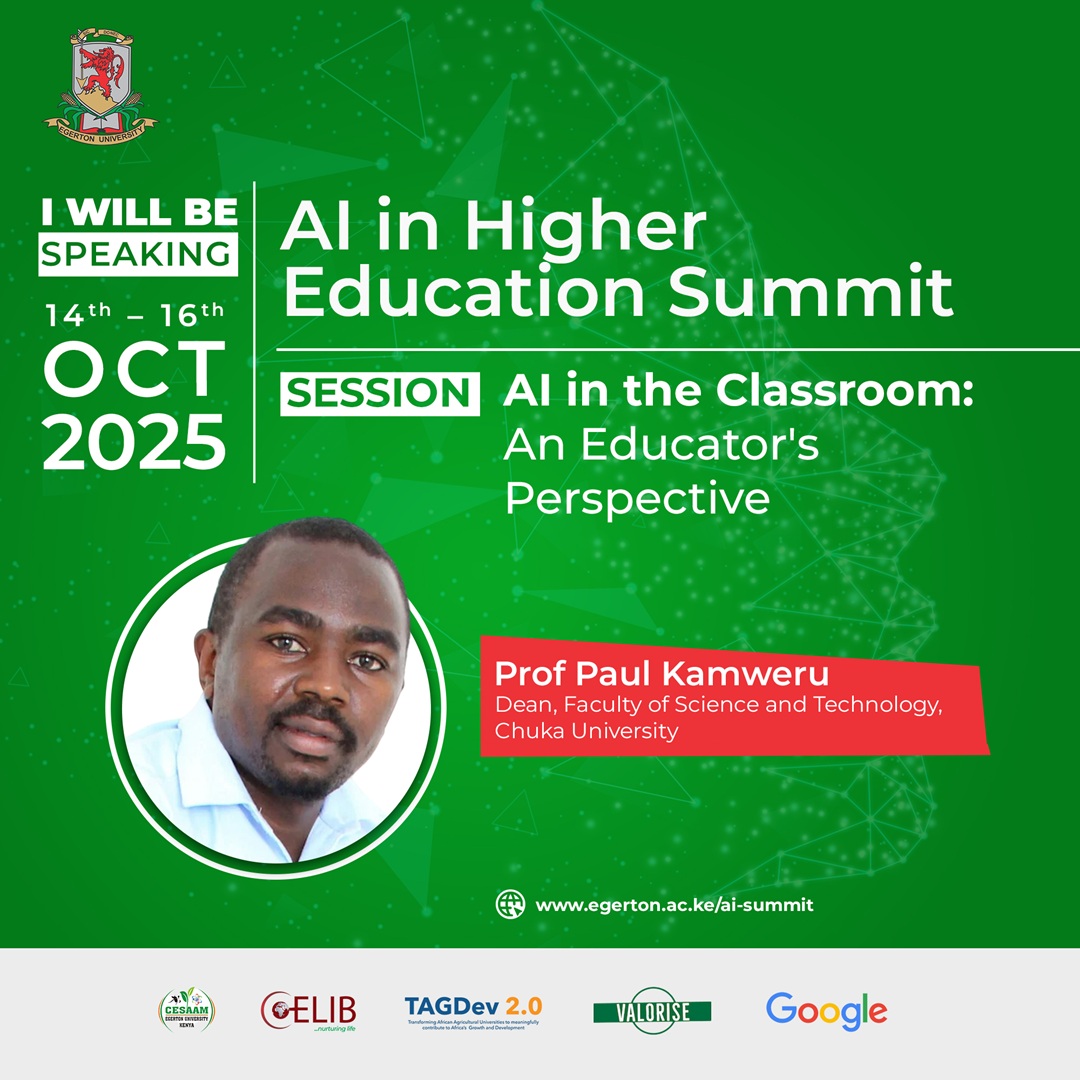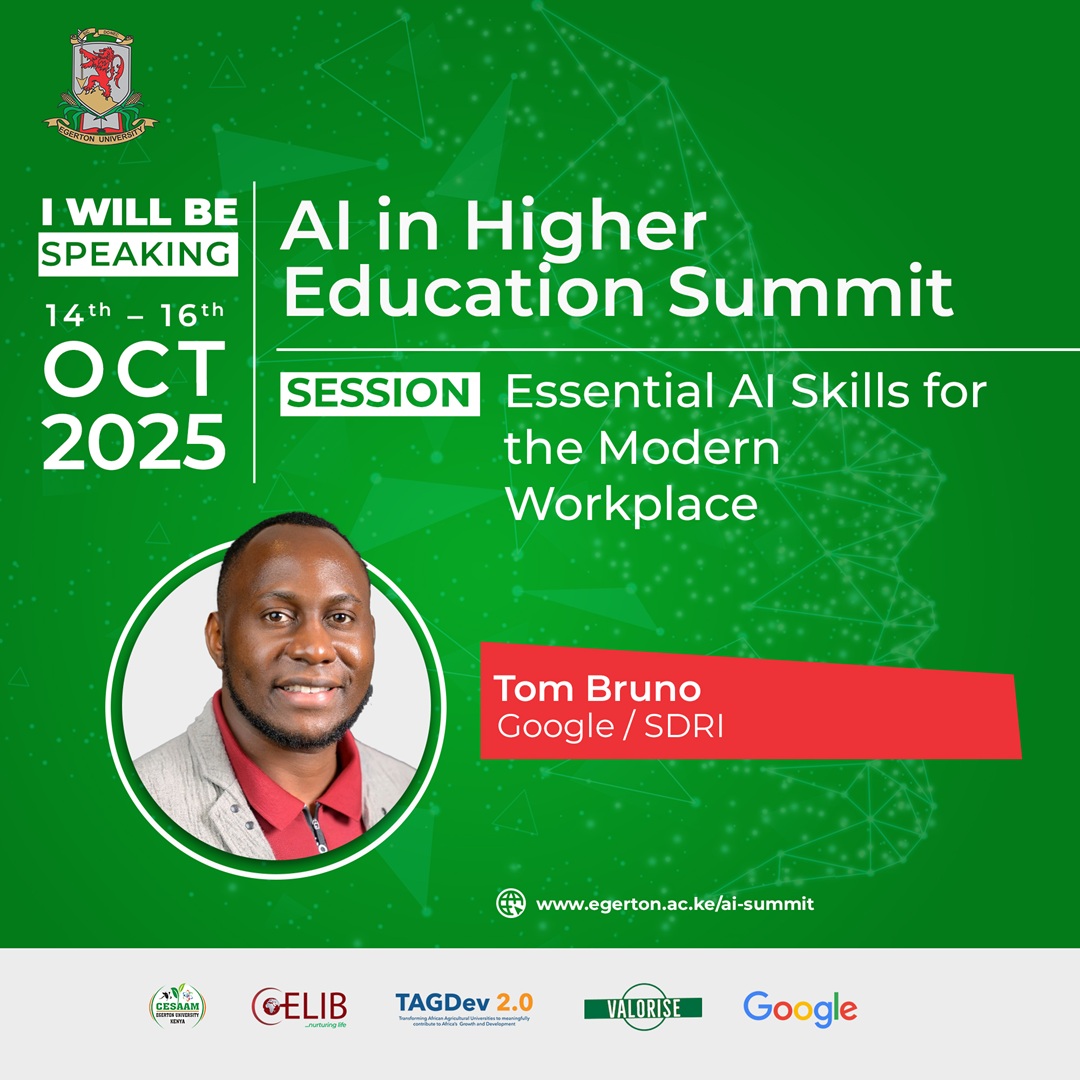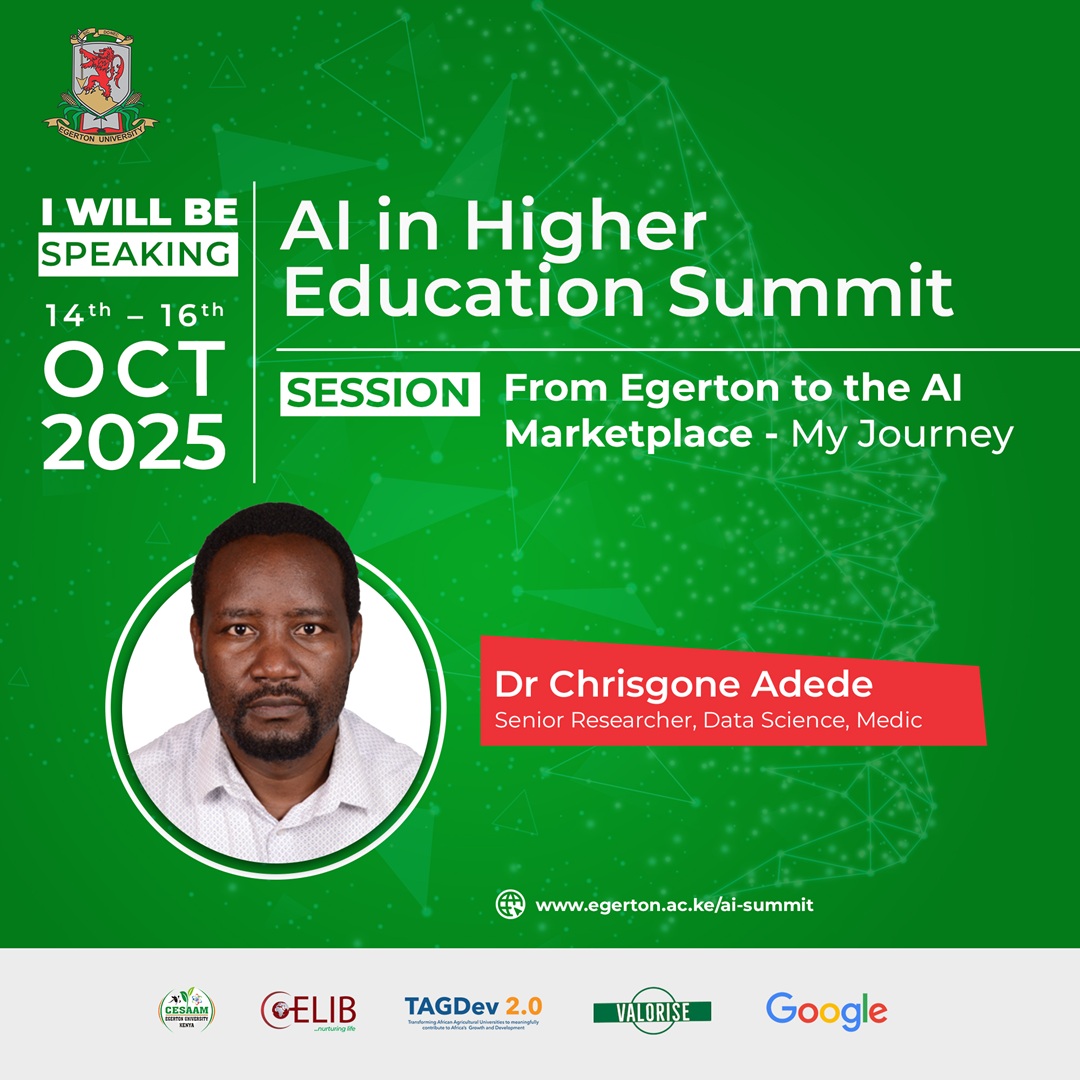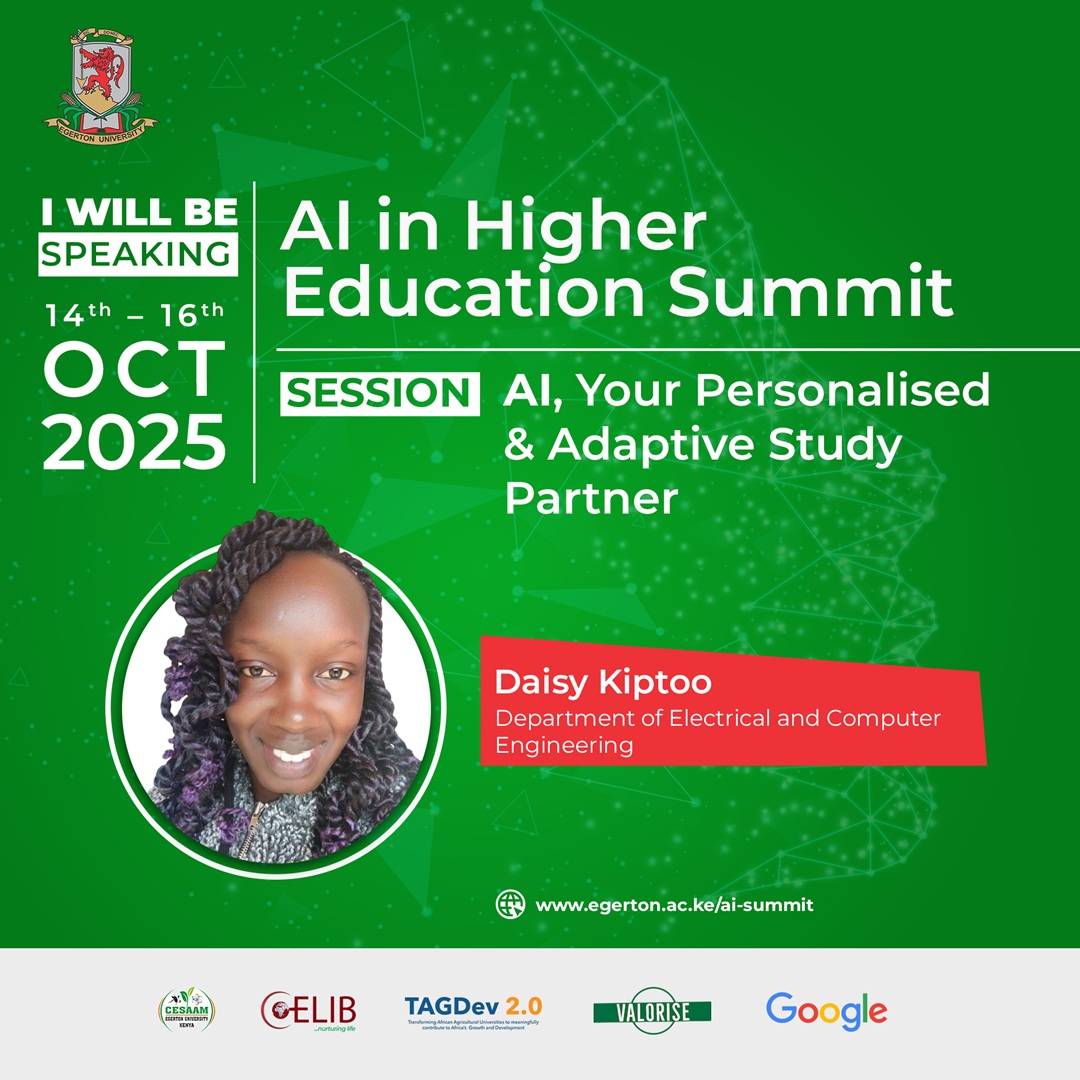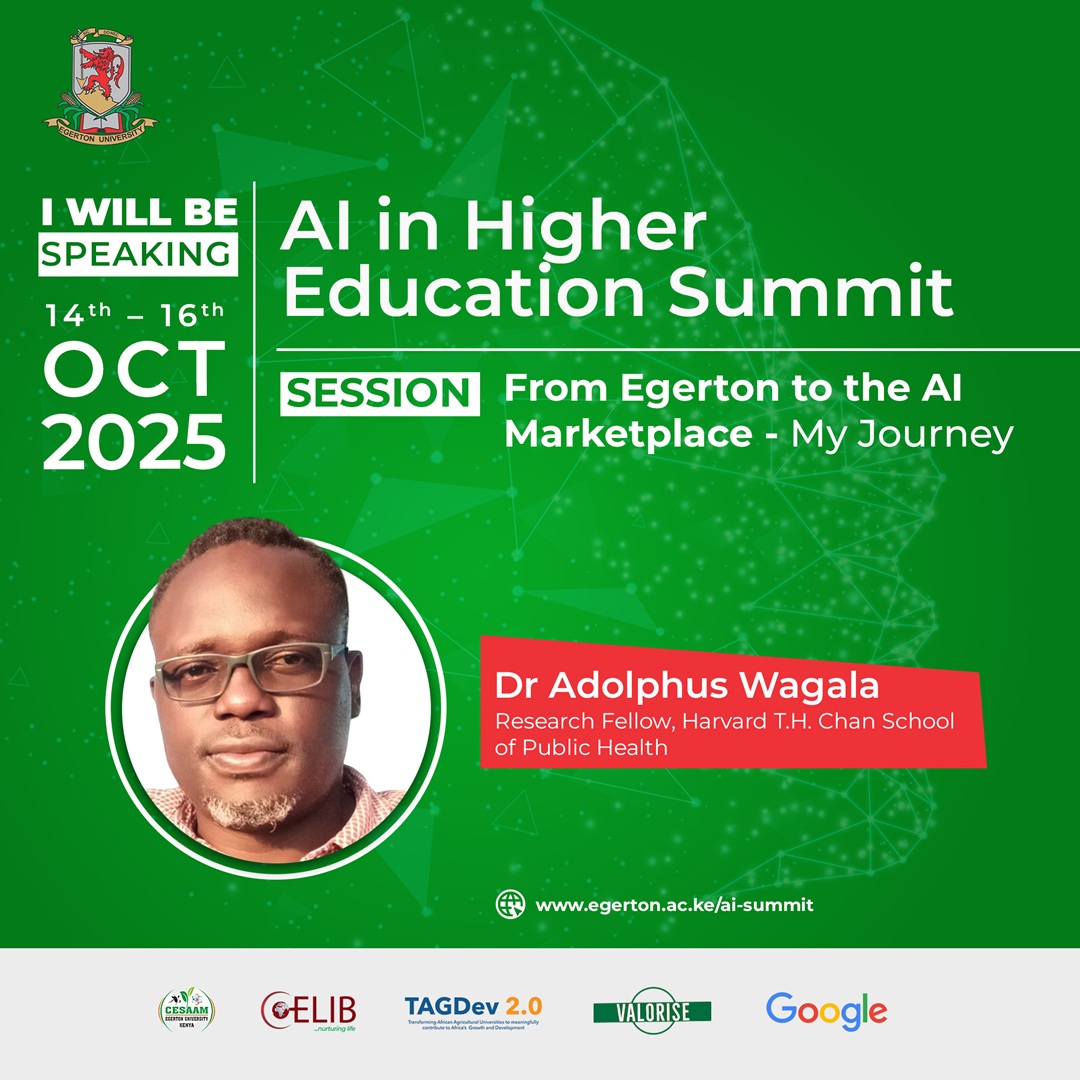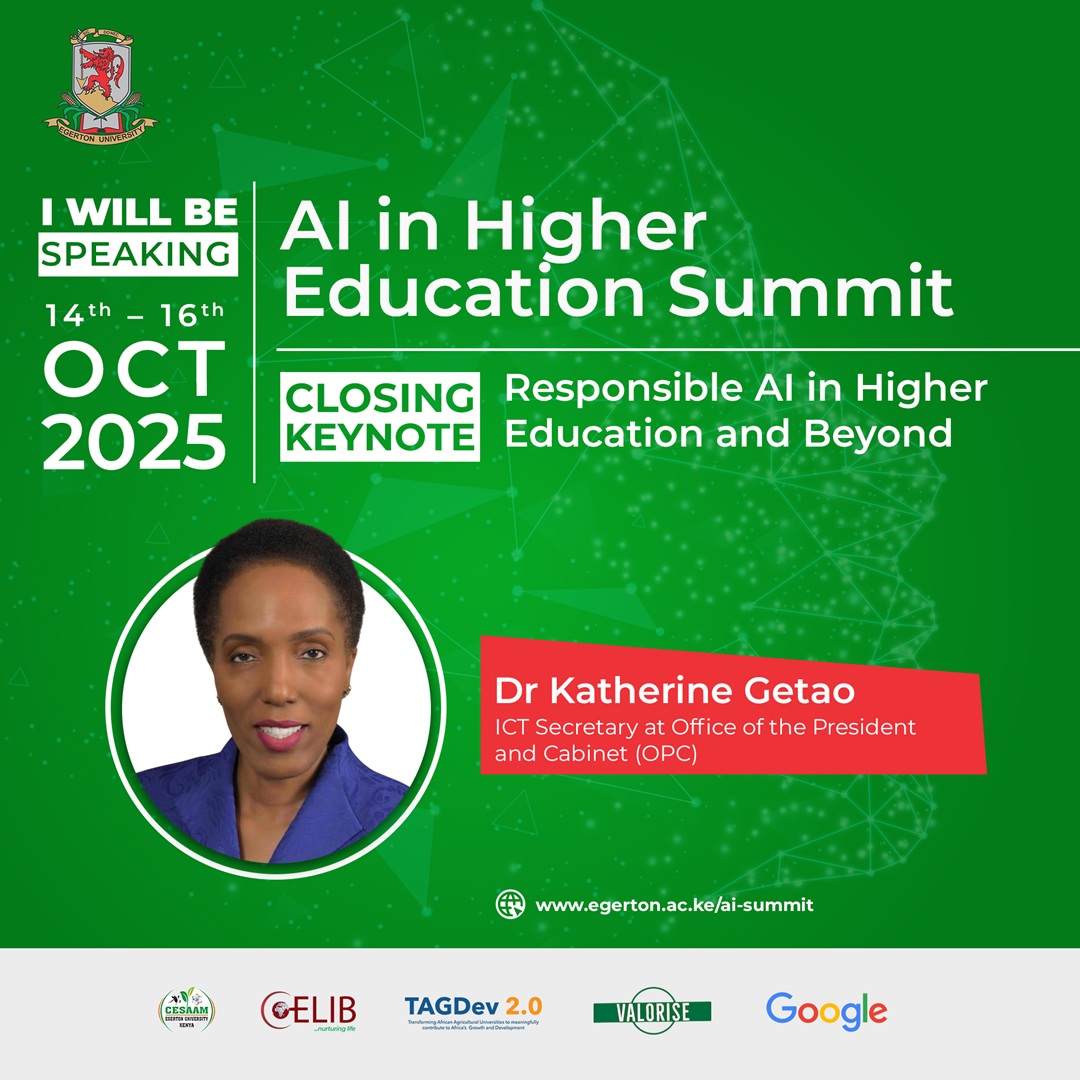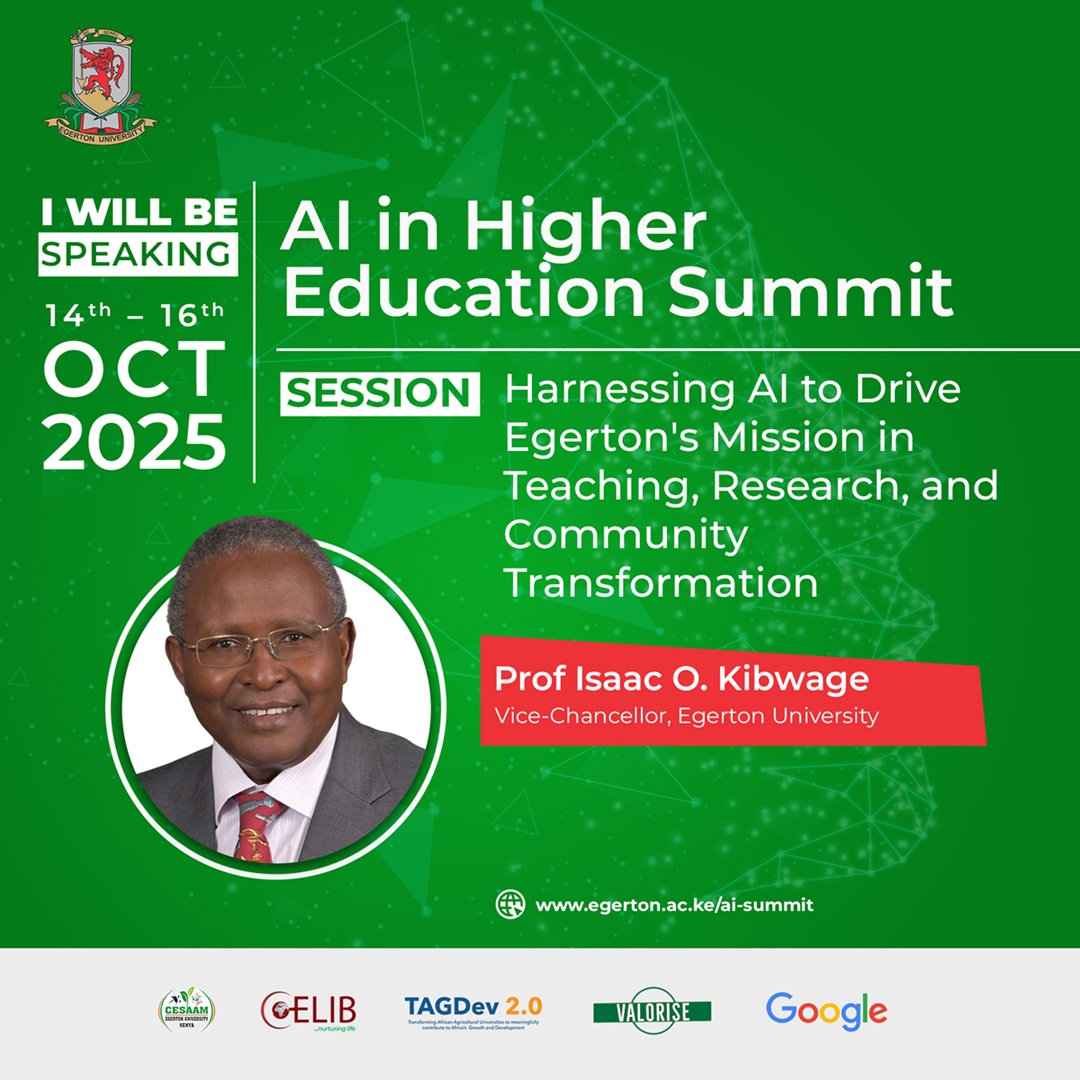Greetings to the Alumni at the Forty-First Graduation Ceremeony of Egerton University! Congratulations on the hardwork you have done. You have beengiven the tools; now put them to work.
I'm grateful that Egerton gave methe first tools that headed me in thedirection of agriculture, setting mycourse in life when I was 17 years old, theright time to do it. It started me off on mycareer of thirty-three years working forthe United States Department ofAgriculture (USDA) in AgriculturalResearch.
World War II was not yet half overw h e n t h e Eg er t o n F a r m S ch o o lestablished a programme for an expectedinflux of returning white servicemen whowould want to get into agriculture oncethe war came to an end. Participating inthat programme was a perfect experiencefor me. I was born and raised in Kenyaand was familiar with the environmentbut had no knowledge of the details ofhow crops were grown and livestockmanaged.
I was one of three young men whowere recruited as sort of guinea pigs – aDane, an Irishman, and a Yank – to helpthe staff develop a-learn-by-doingagricultural training programme. I hearthat there is something like a myth nowcentred on “The First Three” studentswith whom the school started.
The three of us trainees were giventhe use of a new home which was nicelyfurnished. Perhaps it was intended for aninstructor who couldn't be hired becauseof wartime shortages. The school hired aman as a cook and housekeeper for us.We three had no contact with the youngerstudents at the junior secondary schoolwhich was part of the Egerton schoolcum-training-farm.
Since a big part of the training wasthe “doing”, the three of us worked together on most projects. There weretogether on most projects. There wereexceptions, like when we took turns atmilking. A lot of our time was spent doingmanual labour. But we also did “booklearning”.
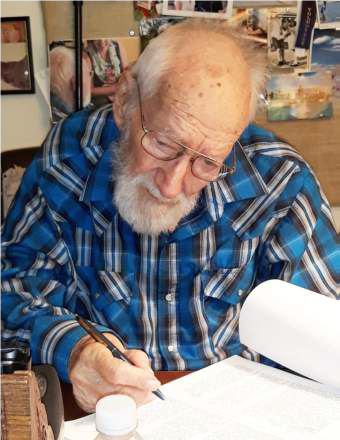 Mr. Paul R. Nixon peruses a document at his home in Fredericksburg, Texas, USA. (Photo courtesy of Mr. Nixon)Economics is a vital part ofsuccessful farming. We discussed therotation of crops, and the economics ofvarious crops. We made estimates of costs of various steps involved incosts of various steps involved ingrowing and marketing of a crop orlivestock. This included dealing with abank, whether asking for a cash advanceor a longer term loan. We had to makeproper conversions in various systems ofweights and measures. Another big part was the understanding of the growth processes of plants and animals. We could barelyplants and animals. We could barelytouch the surface of this vast subject. Ihope future students of a short course willkeep their notes and be prompted tof u r t h e r s t u d y. B e c a u s e o f t i m elimitations, we hardly dwelt on subjectslike soils and weather, let alone anysubjects worthy of Ph.D. dissertations.
Mr. Paul R. Nixon peruses a document at his home in Fredericksburg, Texas, USA. (Photo courtesy of Mr. Nixon)Economics is a vital part ofsuccessful farming. We discussed therotation of crops, and the economics ofvarious crops. We made estimates of costs of various steps involved incosts of various steps involved ingrowing and marketing of a crop orlivestock. This included dealing with abank, whether asking for a cash advanceor a longer term loan. We had to makeproper conversions in various systems ofweights and measures. Another big part was the understanding of the growth processes of plants and animals. We could barelyplants and animals. We could barelytouch the surface of this vast subject. Ihope future students of a short course willkeep their notes and be prompted tof u r t h e r s t u d y. B e c a u s e o f t i m elimitations, we hardly dwelt on subjectslike soils and weather, let alone anysubjects worthy of Ph.D. dissertations.My personal interest was in farmimplements, particularly the school'sFarmall tractor. I enjoyed tinkering withit, supposedly improving the timing ofengine performance. We had a new Fordpickup truck to use on the job, and one ofthe other two trainees ran it off the muddyroad into a bank. I think I was theprincipal's pet because, after that, he saidthat I was to be the only one to drive it.
I had brought my 3030 Winchesterrifle to school with me and used it to killmeat for the table and to scare off gamethat raided our field crops.Thinking back, I realise howvaluable my six months at Egerton werein shaping my career. My first job was atthe Menengai Estates wheat fields. I usedwhat I learned at Egerton in duties suchas keeping the threshers on combineharvesters in running order.
Next I went to work for the KenyaSoil Conservation Service (KSCS). Twoof my special friends in the KSCS wereOnesmus Musyoki, who went on to anoutstanding career in soil conservation inUkambani, and Peter Koinange, the sonof a Kikuyu paramount chief. Sometimeson walks during off-duty hours I enjoyedwonderful discussions with these menwho were secondary school graduates,which was not common in those days,and we all had a love for the land. Theywere several years older than I. We oftentalked about the need for preventing theland's deterioration by erosion fromrainfall.
Another one of the people I workedwith was a rod man on the surveyingteam, who was about my age. He and Ialso had many discussions, with each ofus vigorously arguing our point of view.He pointed out the inequities in thetreatment of the native people and the unfairness of settlers' privileges, while Iunfairness of settlers' privileges, while Imaintained the point of view of somewazungu. I sincerely regret that, as youngas I was, I did not have a broader, morebalanced understanding at the time.
I was an American citizen by birth,and registered for the draft when I turned18, but was not called to service untilover two and a half years later, when Iwas working for the KSCS. I worked as asurveyor in the US Army AviationEngineers battalion, which was buildingand maintaining airfields in Egypt andArabia.
At the end of World War II, I went tonight school at Brooklyn High School inNew York to finish my secondarytraining, and was accepted to college.Iowa State University was recognised asthe premier agricultural traininginstitution, so that's where I went for myBachelor's degree. After working for theUSDA Soil Conservation Service for twoyears, I returned to Iowa State for aM a s t e r ' s d e g r e e i n a g r i c u l t u r a lengineering. Later in my career, I had theopportunity to go to Stanford Universityfor a Master's degree in hydrology.
The first half of my career, whichwas in California, was in watermanagement engineering, and the lasthalf was in Texas, where I worked inremote sensing using aircraft andsatellite data. In California, my principalduties were as leader of a court-orderedmulti-agency study of ground waterrecharge in the Santa Ynez River lowerbasin. A large reservoir had been built onone side of a mountain range, and atunnel dug to deliver water to counties onthe other side. When I delivered the finalreport of the study's findings, I hadworked myself out of a job.
In Texas, one activity was asPrincipal Investigator of the HeatCapacity Mapping Mission of theNational Aeronautics and SpaceAdministration (NASA), using satellitedata. Then, during the last several yearsof my career, I was at the USDASubtropical Research Labs as researchleader, where we were developing techniques that related to ground, aircrafttechniques that related to ground, aircraftand satellite information, and theirapplication to soils, climate, andcropping practices and problems. Thisincluded developing procedures for thecoordinate use of satellite data systems.LANDSAT, NOAA-7, and GOES werestate of the art at the time.
I went back to Kenya sixty yearsafter leaving, found a population seventimes what it was when I was there, andwas pleased to see the changes that hadtaken place, even sky scrapers in Nairobi.What progress! Of course it also broughtproblems, starting with a growingpopulation's strain on natural resources.
Compare the Kenya of the old dayswith today's where it seems everybody iswearing shoes and carrying phones. Atour time, in the interior, there were nomeans of wheeled transport, roads ortowns; there were digging sticks insteadof jembes, no working for wages, nomethod of writing or numbering systems,no standard weights or measures, and nocalendar. Kenya has come a long waysince that period of history.
Now there is technology. Africanshave not only grasped but alsochampioned some of the technologicalinnovations. Kenya almost skipped overlandline phones and went straight tomobile, for example. All this speaks wellfor an ambitious people.
There's been such a big step ineducation. I'm thrilled that Egerton hasdeveloped into such an outstandinguniversity, and it is due in large part to anexcellent faculty and bright studentsdriven by ambition who decide to cometo it.
Egerton University's graduands of2019 will spearhead Kenya's future. Ihope that every one of you, in whateveryou do and in whatever venue, will bringbenefit to the people of Kenya andbeyond, thereby bestowing honour upon Egerton University.
My early years bring for memories of the hard struggle my parents wagedto provide a living for our family. Welived in the village of Makuyuni, a tinystation on the railway line from Tanga toMoshi, and our sole possession was asmall duka. We had no electricity, norunning water, and we had to contendwith a hole dug in the ground for a toilet.Our house provided no protection fromthe heat wave, which caused such aserious infection in my eye that I nearlylost my sight.
With little understanding of ourcircumstances, one day I asked my Dad:“Why do you always choose the last trainon Sunday night for the trip from Tangato Makuyuni”? “My son”, he saidthoughtfully, “this is when the third classticket is cheapest, as the train is almostempty. This is all we can afford.”
Despite the hardships, my parentsdreamt of a different future for theirchildren, and that meant giving them thebest education. Spurred by their dream, Icompleted my Cambridge O-levels.
(Grade 12). Moving ahead would have(Grade 12). Moving ahead would havebeen difficult, but I was fortunate toqualify for an Aga Khan Scholarship.This took me to Egerton College inKenya, where I enrolled in the class of1965 to study Agriculture.
The freedom that college broughtdazzled me. There I was, playing theguitar and Beatles music, becomingcaptain of the cricket team, partying inthe Junior Common Room, and havingfun travelling to Nakuru, Nairobi, andMombasa. But lo and behold: At the endof my first year, I got the dreadful“Academic Warning”. The writing wason the wall: I could go home withoutcompleting college.
It was our new Principal, Dr. WilliamOdongo Omamo, who saved me. Oneday while walking from lecture room A1to the Administration Building, I heard avoice from behind: “My boys, have youfinished your lectures? What are yougoing to do next?” He was so welcoming,concerned, and sincere that I became allattention. “You may have all the fun 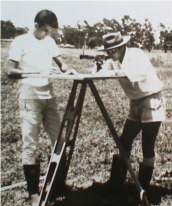 Mr. Sadru Nazarali (left) at a Field Survey practical during his diploma studies at Egerton Agricultural College in 1965-1967 (All photos in the story courtesy of Mr. Nazarali)youwant, but make sure you study hard. Be careful not to waste your chance tocareful not to waste your chance tobecome someone of substance andchange your destiny. If I can help you inanyway, please do not hesitate to call onme”, was his advice. I instantly knewthat I would never let him – and myself –down.
Mr. Sadru Nazarali (left) at a Field Survey practical during his diploma studies at Egerton Agricultural College in 1965-1967 (All photos in the story courtesy of Mr. Nazarali)youwant, but make sure you study hard. Be careful not to waste your chance tocareful not to waste your chance tobecome someone of substance andchange your destiny. If I can help you inanyway, please do not hesitate to call onme”, was his advice. I instantly knewthat I would never let him – and myself –down.
 Mr. Sadru Nazarali (left) at a Field Survey practical during his diploma studies at Egerton Agricultural College in 1965-1967 (All photos in the story courtesy of Mr. Nazarali)youwant, but make sure you study hard. Be careful not to waste your chance tocareful not to waste your chance tobecome someone of substance andchange your destiny. If I can help you inanyway, please do not hesitate to call onme”, was his advice. I instantly knewthat I would never let him – and myself –down.
Mr. Sadru Nazarali (left) at a Field Survey practical during his diploma studies at Egerton Agricultural College in 1965-1967 (All photos in the story courtesy of Mr. Nazarali)youwant, but make sure you study hard. Be careful not to waste your chance tocareful not to waste your chance tobecome someone of substance andchange your destiny. If I can help you inanyway, please do not hesitate to call onme”, was his advice. I instantly knewthat I would never let him – and myself –down.I concentrated on my studies, alwaysdriven ahead by the spirit of seriousnessthat prevailed at the College, and in theend I not only survived but triumphed. Ireceived my diploma in 1967 at agraduation ceremony honoured by hisExcellency President Jomo Kenyatta ofKenya.I w a s t h e fi r s t g r a d u a t e o fpostsecondary education in my familyhistory. My parents felt honoured andwere greatly proud of me. But mysuccess was accompanied by amazingresponsibilities. The onus was now onme to help my family. I was lucky to get ajob with a large farming conglomerate,Karimjee Jivanji Estates, at a tea plantation in the Usambara Mountains inplantation in the Usambara Mountains inTanzania. I soon qualified to attend theTea Managers course at the Kericho TeaSchool, and became an AssistantManager on the plantation, which hadapproximately 400 tea-pluckers and 100field supervisors.
At home in Tanga, with my mother,who was blessed with a green thumb, wewent into a seedling plant business aswell as a home-based food processingbusiness. Unfortunately, this excitingbeginning was suddenly interrupted in am a n n e r t h a t h a d f a r - r e a c h i n gconsequences for our family and for theeconomy of Tanzania.
In late 1970 and 1971, as aconsequence of nationalisation, manyAsians lost their business assets, farmsand plantations, and everything else wepossessed. There was a group ofEgertonians in Tanzania who had kept inclose touch since graduation, and in thespirit of oneness built up over the years,we collectively decided to look for theproverbial greener pastures elsewhere. Inthe course of twelve months, ten of uslanded in Canada, many finding home inEdmonton. Over the next five years weattracted other friends, besides bringingour parents and siblings.
Canada is a country with a strong civil society, respect for democracy, andcivil society, respect for democracy, andappreciation for pluralism. It also ensuressecurity of property and business. Westarted building our new lives there. Overthe years, we Egertonians flourished inbusiness, politics, philanthropy, andglobal citizenship. Our children attendedthe best schools we could wish for andprospered too.
I have been involved in multiplebusiness ventures, including financialplanning, building a chain of retail stores,real estate development, coordinatingi n t e r n a t i o n a l r e c r u i t m e n t o fprofessionals, and providing advice forother immigrant communities inbusiness and real estate.
I was the first Edmonton ChapterChair of the Aga Khan DevelopmentNetwork (AKDN), an organisationwhich provides various types ofassistance to the developing world. Oneof our first activities was to organise apartnership walk in Edmonton in 1985.From an initial number of 145 walkerswe have now reached 4,000. Thesewalkers get donation pledges for projectsin various countries in Africa and Asia.Our collaborative work with the AgaKhan University in Karachi, Pakistan,has been recognised by His Highness the Aga Khan.Aga Khan.
I was also instrumental in gettingthree Ismaili Centers established inEdmonton. I am presently involved insetting up a multigenerational housingfor senior citizens near one of theCentres.
The Nazarali family has also beensupporting political campaigns inCanada for the last forty years. This hasled to close associations with manypoliticians, including Prime MinisterStephen Harper and Prime MinisterJustin Trudeau of Canada.
My joy of assisting development inAfrica never stops. As President of theCanada-Tanzania Business Council, Iwas able to host President JakayaKikwete of Tanzania twice in Canada.Building capacity for the youth hasbeen another focus in my efforts, and Imake sure that my generation as a wholetakes pride in this endeavour. In thisparticular initiative, I have sought andfound alignments with many similarorganisations.In all I do, I am deeply conscious ofhow Egerton College has taught me toresolve local issues with global solutions.
A good number of years ago, in 1973, I received agood number of years ago, in 1973, I received abursary from the Aga Khan Department ofEducation (Tanzania) to study Dairy Technologyat Egerton College, as it was then known. I recall trackingfrom Moshi to Nakuru with Naushad Jan Mohamed, who hadalso received a bursary to studyAgricultural Engineering and would thusbe my college mate. Upon reachingNakuru we looked for Mr. Alibhai Gilani.We had a confidence-building letter ofintroduction to him from his contact inMoshi. Mr. Gilani arranged to have hisson take us to the college. I rememberbeing dropped off just outside theKennedy Hall, which would become ourmeal centre for the next three years.Everybody called it the Mess. We donneda gown every time we went to it fordinner. The greenery of Njoro with itscrisp evening chill and fresh air wasinstantly welcoming.
I had heard numerous stories ofEgerton College: of how it had begun asan agricultural school for children ofcolonial farmers; how, in 1961, thecollege had opened its doors to studentsof colour; and how elitist it had been inthe colonial-era treatment of its students.Every evening the students left theirshoes outside their room to have thempolished for next morning and droppedtheir dirty clothes in a bag to have themwashed and ironed. None of theseprivileges existed in 1973. However, thepristine environment and pride in upkeepwere evident.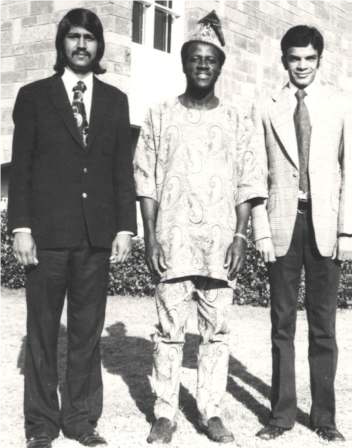 Mr. Shiraz Shariff (left), Vice-President of the Egerton Students Union, together with the Union’s President, Mr. U.A. Salau (centre), and Treasurer Moez Fazal, during the 1974–1975 academic year (Both photos in the story courtesy of Mr. Shariff) I was assigned a cornerroom at Old Hall and marvelled at theflowers and green shrubs growing outsidemy window. The magical atmosphere inspired me to write a few poems.inspired me to write a few poems.
Mr. Shiraz Shariff (left), Vice-President of the Egerton Students Union, together with the Union’s President, Mr. U.A. Salau (centre), and Treasurer Moez Fazal, during the 1974–1975 academic year (Both photos in the story courtesy of Mr. Shariff) I was assigned a cornerroom at Old Hall and marvelled at theflowers and green shrubs growing outsidemy window. The magical atmosphere inspired me to write a few poems.inspired me to write a few poems.
 Mr. Shiraz Shariff (left), Vice-President of the Egerton Students Union, together with the Union’s President, Mr. U.A. Salau (centre), and Treasurer Moez Fazal, during the 1974–1975 academic year (Both photos in the story courtesy of Mr. Shariff) I was assigned a cornerroom at Old Hall and marvelled at theflowers and green shrubs growing outsidemy window. The magical atmosphere inspired me to write a few poems.inspired me to write a few poems.
Mr. Shiraz Shariff (left), Vice-President of the Egerton Students Union, together with the Union’s President, Mr. U.A. Salau (centre), and Treasurer Moez Fazal, during the 1974–1975 academic year (Both photos in the story courtesy of Mr. Shariff) I was assigned a cornerroom at Old Hall and marvelled at theflowers and green shrubs growing outsidemy window. The magical atmosphere inspired me to write a few poems.inspired me to write a few poems.By 1973 the College had built a reputation for itselfthroughout Africa, and there were students from all over thecontinent in its various programmes. I came across andinteracted with students from Nigeria, Botswana, andTanzania, all of whom were in the Dairy Technology programme with me. The Guildford Institute of Dairyprogramme with me. The Guildford Institute of DairyTechnology was established with funds from overseasdonors. We even had professors from Denmark (Mr. Hanson)and India (Mr. Bhanumurti) on the faculty along withKenyans such as Dr. Peter Shalo, who was the Chairman ofthe Department of Dairy Technology.
By 1974 I had become quite involved with studentadvocacy and successfully ran for the position of Vice-President of the Egerton Students Union (ESU). Mr. U. A.Salau of Nigeria was elected as President, and Mr. MoezFazal of Tanzania was elected as Treasurer. We put in a lot ofeffort to develop the Junior Common Room (JCR), arecreational centre for students and a party place with alounge for entertainment. ESU made profits from the JCR canteen, and the money was used for celebrating year-endcanteen, and the money was used for celebrating year-endevents and Christmas parties. It was at such functions that thestudents were able to socialise and make friends.
Upon graduation in 1976 with a Diploma in DairyTechnology, I made applications to the agricultural faculties ofthe University of Strathclyde in Scotland, the University ofIowa in the USA, and the University of Guelph in Canada. Itfelt great to be admitted to all three universities. This successwas a confirmation of the recognition Egerton College hadachieved on the international academic stage. I accepted theUniversity of Guelph because of the scholarship I was offered.However, I ended up doing my undergraduate and graduatestudies in Social Work at the University of Calgary.
Calgary is a city at the foothills of the Rocky Mountains inAlberta, Canada, which is home to my family. In 1995 I ran in aby-election for public office as Member of the LegislativeAssembly (MLA) for the Government of Alberta and served forfour successful terms from 1995 to 2008. At the beginning ofeach term the MLAs elected from among themselves threePresiding Officers – the Speaker, the Deputy Speaker, and theDeputy Chair of Committees. For two of my terms I was alsoelected by my peers as Deputy Chair of Committees. It did nottake me long to realise that the skills I had built as Vice-President of ESU had prepared me well for the leadership role Iassumed in Alberta.
During my days as an MLA I worked on projects of GoodGovernance in various parts of the world, and especially inSouth Africa, which had just dismantled the apartheidestablishment. Alberta had twinned with the Province ofMpumalanga, formerly Central Transvaal of South Africa, andI worked on building capacity in the senior bureaucracy of thatprovince. We had identified ten departments to which weprovided mentors and training at the University of Alberta.President Thabo Mbeki acknowledged to me the positiveimpact our mentorship programme was having on the newcadre in the Mpumalanga government.
When in August of 2019, after 46 years for me and 58 yearsfor the first interracial class, some of us alumni had a reunion atNjoro, I was deeply moved to re-live the memories of myyouth, all of which were invigorating and a source of pride. TheUniversity was a most generous host. We are grateful to it as wealso pay tribute to the memory of Dr. William Odongo Omamo,the first African Principal of the College which has given to theworld thousands of agricultural practitioners.

